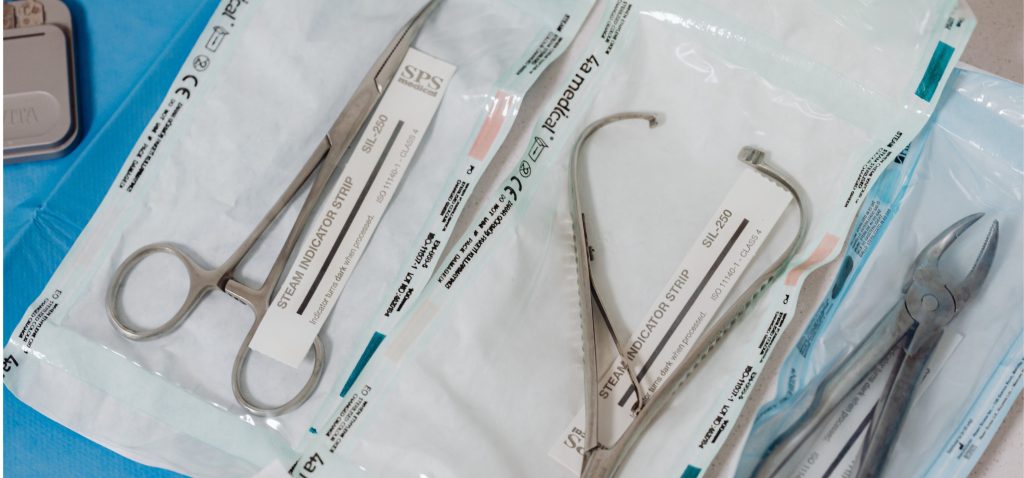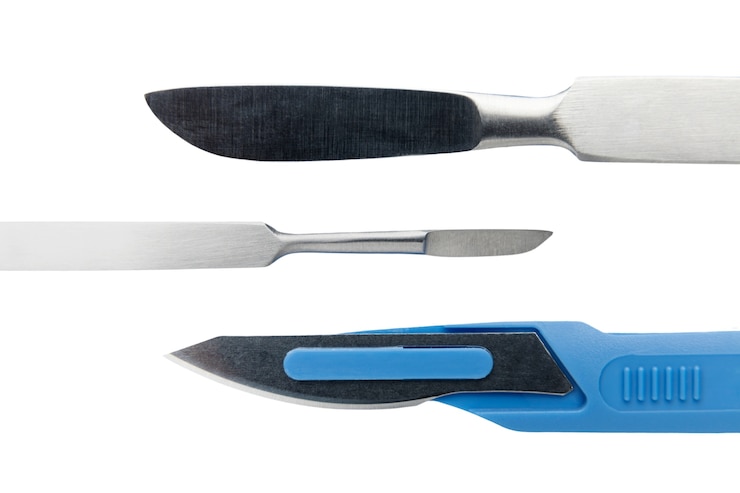What if the tool used in one surgery was reused in the next without proper cleaning? How safe would that be?
In the fast-moving world of healthcare, hygiene and patient safety are not just important; they’re non-negotiable. Hospitals and clinics deal with hundreds of surgeries every day, and ensuring each instrument is perfectly sterile can be time-consuming and expensive. That’s where disposable surgical instruments are making a big difference.
From reducing the risk of infection to saving time and money, these single-use tools are becoming essential in modern medical setups. In this blog, we’ll explore how disposable medical instruments offer a perfect balance of hygiene, efficiency, and cost-effectiveness for today’s healthcare professionals.

What Are Disposable Surgical Instruments?
Disposable surgical instruments are medical tools that are designed for single-use only. Once used during a surgery or medical procedure, they are safely discarded. These tools are usually made of high-quality medical-grade plastic or stainless steel and come pre-sterilised and packaged.
Common examples include:
- Scalpels
- Forceps
- Scissors
- Retractors
- Clamps
- Needle holders
They look and feel similar to reusable instruments but are used once to maintain hygiene and prevent cross-contamination between patients.
Why Hygiene Matters More Than Ever
Clean surgical tools are important to protect patients and doctors. If tools are not clean, harmful germs can spread during surgery. This can lead to infections, slower healing, or even serious illness. That’s why good hygiene in hospitals is more important than ever, especially with new diseases and busy surgery schedules.
1. Prevents Infections
Disposable tools like foam dressings for wounds are used only once and thrown away. This stops germs from moving from one patient to another. It helps avoid dangerous infections, which can make recovery longer or more difficult.
2. Keeps Patients Safe
Clean tools mean fewer problems during or after surgery. Using fresh, sterile tools for every patient helps keep them safe, reduces pain, and helps wounds heal faster.
3. Protects Healthcare Workers
Doctors and nurses also face risks when handling dirty instruments. Using disposable tools lowers the chance of them getting sick from contact with infected blood or body fluids.
4. Saves Time on Cleaning
Reusable tools need to be washed, which takes time. Disposable tools don’t need cleaning. This means faster service for patients and more time for doctors to focus on care.
5. Reduces Human Error
Sometimes, reusable tools are not cleaned properly by mistake. Disposable tools remove this risk because each one is already clean and ready to use, reducing the chances of human error.
6. Better for Emergency Situations
In emergencies, there is no time to clean and prepare tools. Disposable instruments are always ready to use, making them perfect for urgent surgeries or quick treatments.
Speed and Efficiency in Surgeries:
Time is significant in medical procedures. Delay can cause complications. Disposable equipment facilitates quickening procedures in the following ways:
- No sterilisation required: Once a procedure is done, reusable equipment needs to be cleaned, dried, sterilised, and repacked. Time is required for this. Disposable equipment avoids all that.
- Always available for use: Because they are pre-packed and sterile, doctors can just grab them and use them instantly.
- Rapid turnover in operating theatres: Hospitals are able to have operations conducted back-to-back without the need to wait for equipment to be sterilised afresh.
This efficiency comes in handy in busy hospitals and high-stress situations such as emergency departments and disaster response teams.
Cost-Effectiveness: A Long-Term Advantage
Disposable medical accessories would, at first sight, appear more costly compared to reusable ones. However, the complete picture is different. Here is why they are actually cost-saving in the long term:
- No sterilisation expense: Reusable devices require special equipment, cleansing reagents, personnel, and maintenance. Everything increases hospital costs.
- Fewer infections: fewer readmissions: Hospital infections drive up the cost of treatment. Disposable instruments reduce the number of these infections, saving on prolonged stays or treatments.
- Less labour: Fewer employees are needed by hospitals for cleaning and sterilising equipment, reducing staff expense.
- No repair or replacement necessary: Reusable instruments deteriorate and require repair or replacement over time. Disposables don’t.
By eliminating concealed costs, hospitals are able to make their operations more affordable and consistent for patients as well as their employees. Hospitals can make their processes more affordable and reliable for both staff and patients.
Environmental Concerns: What About the Waste?
One common concern is that disposable instruments increase medical waste. And yes, they do. But there’s a growing push toward eco-friendly disposal methods.
Some solutions include:
- Using recyclable materials in disposable tools.
- Partnering with medical waste recycling programs.
- Eco-designs that reduce plastic use.
Hospitals are also balancing usage by combining disposables with essential reusables when needed, depending on the situation.
Where Are Disposable Instruments Most Useful?
Disposable medical instruments are helpful in many types of healthcare settings. These are easy to handle, always sterile, and are ideal when there is not enough time to clean reusable instruments. Such instruments become very essential in places where quick, safe, and economical medical care is being resorted to.
1. Small Clinics and Outpatient Centres:
Minor surgeries/treatments may be done at these places. They may not have large cleaning machines or staff for sterilisation. Disposable tools make it easier and safer to use because they’re ready to use, and they don’t have to be cleaned after.
2. Emergency Rooms:
In emergencies, every second counts. Doctors need tools that are ready to use right away. Disposable instruments save time and lower the risk of infection, which is very important during urgent care.
3. Rural or Remote Hospitals:
Some hospitals in remote areas may not have the equipment to properly clean tools. Disposable instruments are helpful in these situations because they are clean, safe, and don’t require any machines to be reused.
4. Mobile Medical Camps:
During health camps, doctors treat many people in a short time, often in temporary setups. Disposable healthcare equipment is ideal in this context because it is easy to carry, doesn’t need sterilisation, and can be thrown away safely after use.
5. Disaster Relief and Military Operations:
In areas affected by floods, earthquakes, or during wars, medical teams work in difficult conditions. Disposable tools help treat people quickly without needing electricity or machines for cleaning.
6. Dental and Eye Clinics:
These clinics often use delicate instruments for short procedures. Disposable tools help lower the risk of infection and make cleaning easier, saving time for staff and keeping patients safe.
Quality and Safety: Are They as Good as Reusable Tools?
Yes, absolutely. Disposable instruments used today are:
- Made with strict quality control.
- Sterilised under international medical standards.
- Tested for sharpness, durability, and performance.
Leading medical brands design disposable tools that offer the same precision and comfort as reusable ones.
Doctors and surgeons have given positive feedback, especially about:
- Grip and handling
- Consistent sharpness
- Easy packaging and labelling
Conclusion:
Livingstone International is a trusted company, supplying disposable instruments for use in businesses, homes, and government departments across Australia. We offer a one-stop shop experience for healthcare supplies, hygiene and cleaning supplies, educational supplies, office supplies, and laboratory supplies.
With a strong supply chain backing and warehouses all over the country, we ensure efficient delivery service without any interruptions across Australia. We supply hospitals, aged-care facilities, schools, and laboratories with the required materials whenever the need arises to create an environment that is safer, cleaner, and more efficient for everybody. So, partner with us and experience the difference!
Faqs:
1. What are the advantages of bulk purchasing disposable surgical instruments for hospitals and clinics?
Bulk buying lowers costs, ensures stock availability, and improves supply efficiency.
2. Can I set up a recurring supply contract for medical supplies online in Australia?
Yes, recurring supply contracts are available to ensure consistent delivery and stock.
3. What compliance and quality standards do your disposable medical instruments meet?
They meet Australian TGA requirements and international standards.
4. How can my business apply for a trade account or get bulk pricing on healthcare supplies?
You can apply online or contact our team to access trade pricing and account benefits.
5. Are disposable instruments strong enough for high-pressure surgical procedures?
Yes, most are made from medical-grade materials suitable for standard surgical tasks.




